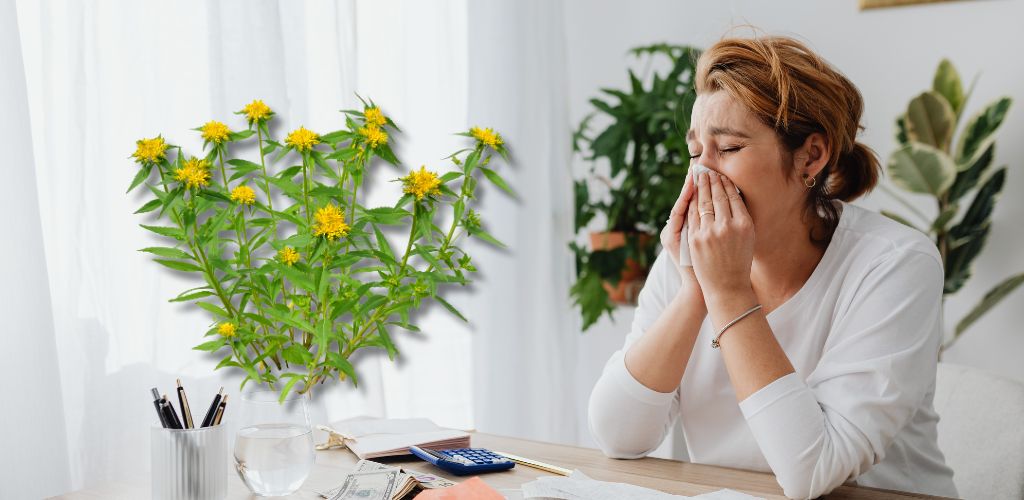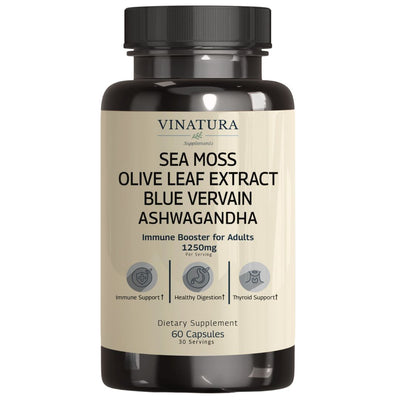
Rhodiola for Anxiety & Mood: Does Rhodiola Reduce Stress?
Rhodiola rosea, also known as Golden Root or Arctic Root, is an herb used in traditional medicine for thousands of years.
It's famous for boosting the nervous system, lifting mood, improving work performance, fighting fatigue, and preventing high-altitude sickness. But does it really work? Let's find out.
Before exploring further, please read the disclaimer located at the end of this webpage.
Key Takeaways
- Rhodiola rosea is known for reducing stress and anxiety.
- Studies show Rhodiola can improve mood and reduce depression symptoms.
- Rhodiola may start to work shortly after you begin using it.
- Following the recommended dosage is crucial for best results.
Does Rhodiola Reduce Anxiety?

Rhodiola is famous for its adaptogenic properties, meaning it helps the body handle stress better [1].
A study shows Rhodiola rosea can reduce symptoms of anxiety, including social and panic anxiety [1].
Another research indicate that Rhodiola can lower anxiety levels within a few days to weeks [2]. This makes it a popular natural option for managing anxiety and stress.
Benefits of Rhodiola for Anxiety, Stress & Depression
Reducing Anxiety
Rhodiola helps reduce anxiety by balancing neurotransmitters like serotonin, norepinephrine, and dopamine [3]. These chemicals are crucial for mood regulation and anxiety relief.
- Serotonin: Rhodiola increases serotonin levels, which helps improve mood and reduce anxiety.
- Norepinephrine: Rhodiola boosts norepinephrine production, enhancing alertness and reducing stress.
- Dopamine: Rhodiola prevents the breakdown of dopamine, increasing pleasure and reducing anxiety.
By balancing these neurotransmitters, Rhodiola effectively improves mood and reduces anxiety.
Anti-Stress Effects
Rhodiola is an adaptogen, helping the body handle stress better. Research shows Rhodiola can prevent chronic stress and its complications [4]. It also helps regulate cortisol levels, the primary stress hormone.
One study found that using Rhodiola Rosea reduced cortisol levels and stress in sedentary people doing short, high-intensity exercise [5].
Reducing Depression
Rhodiola supports mood regulation and eases depression symptoms. It can enhance serotonin production, a key neurotransmitter for mood.
Some studies show Rhodiola is effective in reducing depression symptoms, similar to traditional antidepressants but with fewer side effects [3].
Compared to antidepressants like Zoloft (sertraline), Rhodiola has fewer side effects, making it a good alternative for those who can’t tolerate medication side effects.
Enhancing Work Performance
Rhodiola can improve focus and reduce fatigue, helping you perform better at work or study. It also helps reduce social and panic anxiety.
A study with young physicians found that Rhodiola extract significantly improved mental performance and reduced fatigue during night shifts, with no side effects [6].
Explore more: What are the Benefits of Rhodiola For Athlete's Performance?
How Does Rhodiola Rosea Improve Mood, Reduce Stress and Depression?
Rhodiola helps reduce anxiety by:
- Regulating cortisol levels: This provides stress relief and improves the ability to handle pressure [3].
- Enhancing neurotransmitter function: Rhodiola positively affects neurotransmitters like serotonin and dopamine, improving mood and reducing anxiety and depression symptoms [3].
Some suggest Rhodiola has antioxidant effects, protecting brain cells from stress-induced damage [7].
However, more research is needed to confirm this. Overall, Rhodiola rosea offers a natural way to manage anxiety, stress, and depression.
How Long Does Rhodiola Take to Work for Anxiety?

The time it takes for Rhodiola to work can vary. Some people may feel better within a few days, while others may need a few weeks.
For example, an 8-week study found that people with prolonged fatigue saw significant improvement after just one week of taking 400 mg of Rhodiola daily. This suggests its potential for quick anxiety reduction [8].
Another study on mice showed effectiveness after 10 days of use [2].
Generally, Rhodiola may start working within one to two weeks, but long-term use is recommended for best results.
How to Use Arctic Root for Anxiety
Rhodiola comes in various forms, including tablets, capsules, tea, and liquid extracts. Here are some guidelines:
- Dosage: Dosages for depression range from 340 mg to 1,360 mg per day [9]. For stress-related fatigue, 576 mg per day is typical [10]. Start with 200-300 mg and increase gradually if needed.
- Timing: The best time to take Rhodiola is in the morning or on an empty stomach, at least 30 minutes before breakfast and lunch. Use it in the morning or early afternoon to avoid affecting sleep.
Although Rhodiola is safe for long-term use, it contains nitrile compounds that may pose risks if used excessively [11]. Always consult a doctor before starting Rhodiola, especially if you’re on medication or have health concerns.
Read more: Does Rhodiola Make You Sleepy? Can You Take It Before Bed?
Ways to Use Rhodiola:
- Rhodiola Tea: Steep a teaspoon of dried Rhodiola root in hot water for 10-15 minutes.
- Rhodiola Extract (Tincture): Add some extract to water or juice.
- Rhodiola Powder: Mix into smoothies, yogurt, or water.
- Dietary Supplements: Follow the manufacturer's recommended dosage for capsules, tablets, or liquid extracts.
Other Ways to Relieve Anxiety & Stress
- Meditation and Yoga: Improve mindfulness and reduce stress.
- Regular Exercise: Boost endorphins to enhance mood.
- Healthy Diet: Eat plenty of fruits, vegetables, and omega-3-rich foods.
- Sufficient Sleep: Ensure quality sleep for recovery and stress reduction.
Conclusion
Rhodiola rosea is a promising herbal remedy for reducing anxiety, stress, and depression. Using Rhodiola supplements is gaining popularity. However, proper dosage and usage are crucial. Alongside Rhodiola, maintaining a healthy lifestyle and exploring other stress reduction methods can effectively improve mental health.
References
- [1] Panossian A, Wikman G, Sarris J. Rosenroot (Rhodiola rosea): Traditional use, chemical composition, pharmacology and clinical efficacy. Phytomedicine. 2010;17(7):481-493. doi:https://doi.org/10.1016/j.phymed.2010.02.002
- [2] Kelly G. Rhodiola Rosea: A Possible Plant Adaptogen. https://citeseerx.ist.psu.edu/document?repid=rep1&type=pdf&doi=ac23069acec9e462c8ffe292f081556bdd16481d
- [3] Amsterdam JD, Panossian AG. Rhodiola rosea L. as a putative botanical antidepressant. Phytomedicine. 2016;23(7):770-783. doi:https://doi.org/10.1016/j.phymed.2016.02.009
- [4] Stress management and the role of Rhodiola rosea: a review. International Journal of Psychiatry in Clinical Practice. Published online 2018. doi:https://doi.org/10.1080//13651501.2017.1417442
- [5] Jurcău R, Jurcău I, Bodescu C. Anxiety and salivary cortisol modulation in exercise induced stress, using a phytotherapic product containing Rhodiola Rosea. | Palestrica of the Third Millennium Civilization & Sport | EBSCOhost. Ebscocom. 2012;13(3):213. doi:https://doi.org/%22,
- [6] Darbinyan V, A. Kteyan, Panossian A, Gabrielian E, Wikman G, Wagner H. Rhodiola rosea in stress induced fatigue — A double blind cross-over study of a standardized extract SHR-5 with a repeated low-dose regimen on the mental performance of healthy physicians during night duty. Phytomedicine. 2000;7(5):365-371. doi:https://doi.org/10.1016/s0944-7113(00)80055-0
- [7] Zhong L, Peng L, Fu J, Zou L, Zhao G, Zhao J. Phytochemical, Antibacterial and Antioxidant Activity Evaluation of Rhodiola crenulata. Molecules/Molecules online/Molecules annual. 2020;25(16):3664-3664. doi:https://doi.org/10.3390/molecules25163664
- [8] Yevgeniya Lekomtseva, Zhukova I, Wacker A. Rhodiola rosea in Subjects with Prolonged or Chronic Fatigue Symptoms: Results of an Open-Label Clinical Trial. Complementary medicine research. 2017;24(1):46-52. doi:https://doi.org/10.1159/000457918
- [9] Mao JJ, Xie SX, Zee J, et al. Rhodiola rosea versus sertraline for major depressive disorder: A randomized placebo-controlled trial. Phytomedicine. 2015;22(3):394-399. doi:https://doi.org/10.1016/j.phymed.2015.01.010
- [10] Stephanie Maxine Ross. Rhodiola rosea (SHR-5), Part I. Holistic nursing practice. 2014;28(2):149-154. doi:https://doi.org/10.1097/hnp.0000000000000014
- [11] Tao H, Wu X, Cao J, et al. Rhodiola species: A comprehensive review of traditional use, phytochemistry, pharmacology, toxicity, and clinical study. Medicinal research reviews. 2019;39(5):1779-1850. doi:https://doi.org/10.1002/med.21564
Author

Product Disclaimer
Including an ingredient or study does not evaluate, endorse, or recommend any Vinatura product or any third-party product. Some ingredients discussed may not be used in any Vinatura product.
The content of the articles has not been evaluated by the Food and Drug Administration (FDA) and is not intended to promote or endorse any specific product. Any products sold on this website are not intended to diagnose, treat, cure, or prevent any disease.
Opinions and Endorsements
Any claims, statements, or opinions expressed in the articles are those of the author(s) and do not necessarily reflect the views or opinions of the manufacturers of the dietary supplement products. The products sold on this website are separate from the content of the articles and are not directly endorsed or associated with the information presented here.
Liability Disclaimer
The author(s) of the articles, website, and manufacturers of the dietary supplement products do not assume any liability for any potential consequences arising from the use of the information provided in the articles. Ingredient effects, dosages, and safety vary by individual, formulation, and context; some ingredients interact with medications or may be unsuitable during pregnancy or lactation. It is recommended that individuals consult with a qualified healthcare professional before making any dietary or lifestyle changes, including the use of dietary supplements.
Product Usage
Please refer to the product labels and packaging for specific usage instructions and guidelines for the dietary supplement products sold on this website.
Customer Support
For any concerns or questions regarding the dietary supplement products, please contact our customer support team, who will be more than happy to assist you.





Leave a Comment
Be the first to comment.
What do you think?